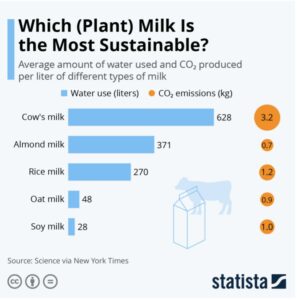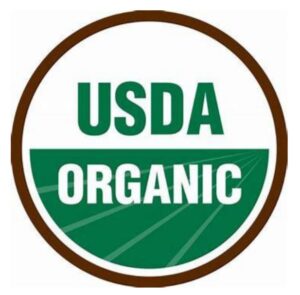![]()
Author: Ashton Knatz
The term “sustainability” has become a buzzword in many different discussions going on today, but what exactly does “sustainability” mean in terms of food choices? When we discuss how your food choices can impact sustainability, we are talking about food choices that are good for your body and the environment. There are many ways to incorporate sustainability into your food purchases. Three great ways to start are by considering vegetarian and vegan options,
looking for organic items, and shopping locally.
More people are making the switch to plant-based eating as more evidence has come out that these diets are highly beneficial for human and environmental health. Research shows that plant-centric diets yield lower carbon dioxide emissions [1], as well as provide protection against heart disease and diabetes, among other diseases [2]. There are lots of vegetarian and vegan swaps you can make, such as egg substitutes, meatless patties, and more. Making even one or two sustainable choices can have a great impact. For this post, I’m going to focus on plant-based milks. There are lots of plant-based milks to choose from, including almond, soy, rice, oat, and even macadamia nut milk! Let’s take a look at the rundown of plant-based milks and see which one is the best choice in terms of carbon emissions and water use.
Image Source: https://www.statista.com/chart/22659/cows-milk-plant-milk-sustainability/
According to this graphic, the production of oat and soy milk use the least amount of water and generate the least carbon emissions, and so they have minimal impacts on the environment compared to cow’s milk. However, another component that must be considered is the packaging and transport time for these milks. If you live in New York, and your oat milk is being transported from California, then there’s a significant amount of carbon emissions still being
released from the lengthy transport. One way to alleviate the environmental costs of lengthy transport is by shopping locally. Iowa City has a great farmer’s market that is held every Saturday in the summer – if you haven’t checked it out yet, I highly recommend you do so once the summer months arrive again!
Image Source: https://dailyiowan.com/2021/05/03/photos-iowa-city-farmers-market/
In addition to considering vegan and vegetarian food items, look for organically-grown and additive-free food items. Look for the USDA Organic seal on products, which certifies that these products are free from synthetic fertilizers, pesticides, and additives. Some supermarkets are now devoting sections of their stores to organic food, and smaller grocery stores, such as New Pioneer Co-Op, are almost entirely devoted to organic, sustainable food. According to the Organic Trade Association, the organic label is the most heavily regulated and closely-monitored food system in the United States, and is backed by very strict processing regulations [3].
Image Source: https://ota.com/organic-101/organic-standards
In conclusion, some great ways to begin incorporating sustainability into your food choices are considering vegetarian and vegan options, focusing on organic food items, and shopping local whenever you can. These might seem daunting, but implementing even one change has huge benefits. Sustainability promotes better health among consumers, and making simple changes to move towards a more sustainable lifestyle is something that will benefit you and the environment. If you have any questions about the content of this post, or about food sustainability in general, please feel free to leave a comment on this post. Thank you so much for reading!
Research Bibliography:
1Springmann, M., Godfray, H. C. J., Rayner, M., & Scarborough, P. (2016). Analysis and
valuation of the health and climate change cobenefits of dietary change. Proceedings of the
National Academy of Sciences, 113(15), 4146–4151. https://doi.org/10.1073/pnas.1523119113
2Good Nutrition. (2019). Physicians Committee for Responsible Medicine.
https://www.pcrm.org/good-nutrition
3Organic Standards | OTA. (n.d.). Ota.com. https://ota.com/organic-101/organic-standards


